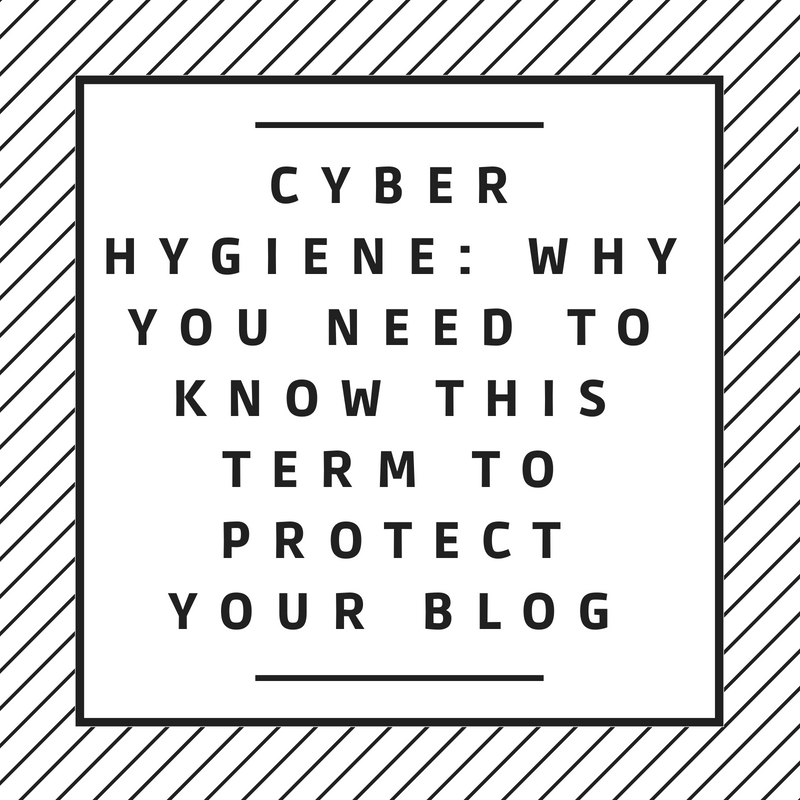When you’re running a blog as a business, most of your daily tasks are digital, including content planning and development to sales and marketing functions, communicating with guest posters and your team, handling finance and accounting jobs and much more. As such, it’s incredibly important for all your systems to be secure.

Hackers are, unfortunately, more of a problem than ever, and each week we hear about another big website that has been compromised or another major company hacked, threatening thousands of businesses and individuals. Cybercriminals continue to come up with more and more sophisticated ways to break into networks and to crash sites or steal data, which puts blog owners at increased risk.
To protect your blog and your income, not to mention your brand’s reputation, you must take action to keep hackers at bay. This is where the term “cyber hygiene” comes in. Read on for the rundown on what this phrase refers to and how you need to be incorporating it into your business planning today.
The Definition of Cyber Hygiene
Basically, cyber hygiene refers to the creation and maintenance of an assortment of daily routines, plus checks and behaviors, required to keep digital security tight. By practicing good cyber hygiene, you will radically decrease the risk of having your blog, computers, and other systems hacked, crashed and taken over.
How Cyber Hygiene Will Protect Your Blog
There are numerous reasons why cyber hygiene is necessary. Apart from keeping hackers at bay by plugging any security gaps, it also means you can more easily:
- Protect client data
- Locate unmanaged assets
- Run compliance audit checks more often and easily
- Discover and repair outdated admin privileges (e.g. when you have guest bloggers or employees who no longer work for you)
- Become aware of any unauthorized software on your computers
Steps Involved
To maintain the online health of your blog, there is a variety of proactive steps you can take. Start by installing quality security software on your computers and other Internet-connected devices. These products will help stop malware from infecting your systems. Firewalls are also vital since they’re an additional line of defense against hackers, particularly those who try to break into your systems via the internet.
It’s also necessary to protect your wi-fi from hackers. The network should be secured with a hard-to-crack password. Good codes should be used on all your devices and on any accounts where you and your team have to log in, such as bank accounts, telecommunications portals, social media sites and the like.
Proper passwords are at least eight characters long and are made up of an assortment of characters, including numbers, upper and lower-case letters and symbols. The codes used should never be anything standard such as “admin”, “123456” or “password” as these are the first things hackers try when attempting to break in.
Furthermore, ensure nobody’s codes are based on names, dates or other information that cybercriminals might be able to find online, on websites, social media platforms, email signatures and so on. Avoid using passwords that relate to addresses, birth dates, pet or children’s names, lucky numbers, taglines, products, etc.
As well, update passwords around every two to three months for maximum security, and use different codes on different websites, accounts, and devices. This way, if one password is compromised, you won’t have to worry that everything is at risk at once.
Another key step is to ensure you’re always running the latest version of software and firmware. Hackers often take advantage of security gaps that open up over time, but software creators plug these vulnerabilities with updates. Always regularly update things like security software and firewalls, operating systems, browsers, apps, games, plug-ins and the like.
Lastly, another habit you need to get into is backing up your data. This is an important step because it means if you ever do have your systems hacked, you won’t be utterly destroyed. You’ll have access to your information via the cloud or through an external hard drive system. It’s best to have things set up so that each time you create or edit a document or other details, it automatically backs up.
You can also stay updated by subscribing to iTechCode.